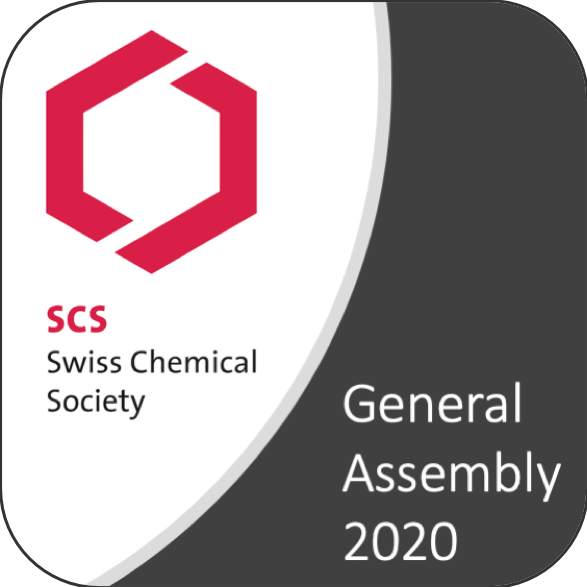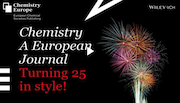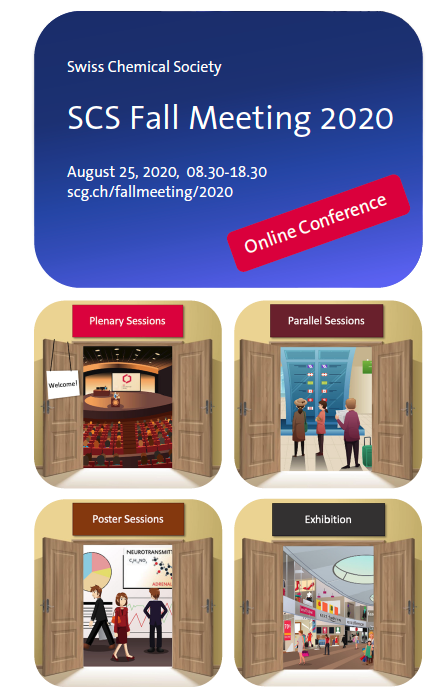25 years Chemistry - A European Journal
Brussels News Update, June 2020
European Highlights, Research, Innovation, Education, Entrepreneurship
Join EuChemS 50th anniversary online celebration
To mark its 50th anniversary since the foundation of the Federation of European Chemical Societies (FECS) in 1970, the European Chemical Society is pleased to organise an online birthday celebration.
The event will be held online on Friday 3 July 2020, from 10:00 to 11:30 (CEST – Brussels time). You are invited to join us, please register here.
See the article here.
EuChemS endorsed the Statement on inclusion and diversity in the chemical sciences
On 15 June 2020, the European Chemical Society endorsed the Statement on inclusion and diversity in the chemical sciences of the Royal Society of Chemistry (RSC).
EuChemS participated in the #EUvsVirus Matchathon
Following the #EUvsVirus Hackathon, the European Commission organised the #EUvsVirus Matchathon on 22-25 May. The goal of the Matchathon was to connect the 120 winning teams from the hackathon with investors, corporates, public authorities (including hospitals), academia, and research institutions. During this event, the winning teams were able to discuss their needs and secure deals with partners, to have their innovative ideas developed and commercialised.
The closing ceremony was held online on 2 June 2020, with the presence of Mariya Gabriel, Commissioner for Innovation, Research, Culture, Education and Youth.
Read more here
A look at the 6 months Croatian Presidency of the Council of the European Union
On 1 January 2020, Croatia took over the Presidency of the Council of the European Union from Finland.
‘A strong Europe in a world of challenges’ was the motto chosen by Croatia before starting its Presidency, and what a challenge Covid-19 has been. The six-months agenda was disrupted by the pandemic and forced Croatia to adapt it to the worldwide crisis: the Council is currently analysing and assessing the Recovery plan for Europe proposal issued by the European Commission. What is more, this Presidency was the first for Croatia since the country joined the European Union in 2013.
See the article here.
ITRE Committee votes to join trilogue negotiations on Horizon Europe
On 4 June 2020, the Industry Committee of the European Parliament has voted to enter into interinstitutional negotiations for five multiannual financial framework files (MFF).
Together with the Council of the European Union and the European Commission, the ITRE Committee can start negotiations on Horizon Europe and other pieces of legislation where it is the lead committee.
Read more about it here.
On the ERC Executive Agency (ERCEA)
The ERCEA supports operationally the ERC Scientific Council. Based in Brussels, the ERCEA is also in charge of the day to day administration of the European Research Council (ERC). Among the many activities conducted by the ERCEA, it is also responsible for the peer review process.
Read more about it here.
Report on illegal and ineffective disinfectants to the European Chemicals Agency
On 5 June 2020, the European Chemicals Agency (ECHA) warned about the increasing commercialisation of non-compliant disinfectants during the COVID-19 pandemic. In a press release, ECHA indicates that twenty Member States of the European Union have reported to ECHA and the European Commission about the growing number of illegal and ineffective hand disinfectants available on national markets.
Consultations & Roadmap
European Commission Public Consultations
A number of consultations put forward by the European Commission are currently open:
- ‘2030 Climate Target Plan’
Deadline: 23 June 2020 - ‘Waste shipments – revision of EU rules’
Deadline: 30 July 2020 - ‘Adapting to climate change – EU strategy'
Deadline: 20 August 2020
European Chemicals Agency Consultations
A number of consultations put forward by the European Chemicals Agency (ECHA) are currently open.
You can take a look at them here.
EFSA Public Consultation on ‘the draft scientific opinion on update of the risk assessment of nickel in food and drinking water'
Deadline: 15 July 2020
You can take a look at it here
Fundings, Nominations & Awards
Marie Skłodowska-Curie (MSCA) open calls
Currently two calls are open: the individuals fellowships 2020 and the co-funding of regional, national and international programmes 2020.
More details here.
ERC Advanced Grant
Researchers who would like to compete for an ERC Advanced Grant have until 26 August 2020 to apply for the next round of funding.
More information about it here.
EuChemS Events
In the current environment and status of COVID-19, some events recognised by EuChemS are being postponed or cancelled.
EuChemS Events calendar is being updated on a regular basis.
If you planned to attend an event, you can check more about it here.
50th anniversary celebration
3 July 2020, 10 - 11.30 am, Online Event
Website: www.euchems.eu
2020 EuChemS General Assembly
24 September 2020, Online Event
Website: www.euchems.eu
8th EuChemS Chemistry Congress (ECC8)
28 August – 1 September 2022
Lisbon, Portugal
Website: www.euchems2022.eu
Read the full BNU newsletter here
EuChemS aisbl - Rue du Trône 62, 1050, Brussels, Belgium; www.euchems.eu. Produced for EuChemS by Nineta Hrastelj, Laura Jousset and Jelena Lazić. This newsletter has been carefully prepared and only contains correct information to the best of EuChemS´ knowledge, however this does not exclude the possibility of existence of incorrect information. EuChemS cannot be liable for the use or misuse of any information, whether correct or incorrect, present at this newsletter. Intellectual property belongs to its rightful owners, always explicitly traceable on each article. Compilation Copyright © 2020 EuChemS
Céline Wittwer, SCS
23.06.2020
Invitation to the SCS General Assembly 2020
 The SCS General Assembly 2020 that was initially planed on April 3, 2020 at FHNW Muttenz, had to be postponed due to the COVID-19 restrictions. It will now take place as a video conference on June 24, 2020, 16.30h - 17.00h.
The SCS General Assembly 2020 that was initially planed on April 3, 2020 at FHNW Muttenz, had to be postponed due to the COVID-19 restrictions. It will now take place as a video conference on June 24, 2020, 16.30h - 17.00h.
You can participate via Zoom video conference platform, meeting-ID: 990 262 974, Password: 031034. Please note that there will be a control of who is joining and we will block non-SCS members accordingly. In 2021 we hopefully can go back to normal and organize the General Assembly again as part of the SCS Spring Meeting at FHNW Muttenz on April 15, 2021.
The Board of Directors invites all members of the Swiss Chemical Society and the delegates of its associated societies to join the 30th General Assembly:
30th General Assembly of the Swiss Chemical Society
June 24, 2020, 16.30–17.00h, Online meeting (Zoom).
Agenda
- Welcome and approval of the agenda
- Election of the vote counters
- Minutes of the 29th General Assembly from April 5, 2019 in Dübendorf (published in CHIMIA 5/2019, A430)
- Annual report 2019 (published on the SCS website and in CHIMIA 1-2/2020)
- Financial statement 2019 incl. audit report (send a mail to to get a copy of the financial statement and the audit report upfront).
- Discharge the Board
- Elections
- Update of the SCS Bylaws
- News and strategic projects
- Outlook 2020/2021
- Varia
Motions to the assembly can be submitted until June 22, 2020 to .
Swiss Chemical Society (SCS)
Dr. Alain De Mesmaeker, President
David Spichiger, Executive Director
Note: the invitation to the 2020 GA was also published in CHIMIA 4/2020 and CHIMIA 5/2020
David Spichiger, SCS
19.06.2020
Open Data Survey (SCNAT)
The Platform Mathematics, Astronomy and Physics (MAP) of the Swiss Academy of Sciences (SCNAT) is launching this survey as a response to recurring comments, questions and sometimes concerns expressed by scientists on the transition towards Open Research Data. Following on other activities of the Swiss Academies of Arts and Sciences like the Open Data Workshop and the factsheet on Open Science in Switzerland, the survey aims to collect the diverse opinions of active researchers in Switzerland on this important topic.
The results are foreseen to be published in autumn upon decision by the MAP Plenum. The more of you that participate, the greater weight this could have in shaping the transition to Open Science in Switzerland. Please, take 10-15 minutes of your time to have your say on the transition towards Open Data in Switzerland. Thank you! (Deadline: 15 July)
https://naturalsciences.ch/organisations/map/open_data_survey
David Spichiger, SCS
16.06.2020
SCS Fall Meeting 2020 - same content, different approach
SCS Fall Meeting 2020 – same content, different approach
The return on the Call for Contributions for the online conference was greater than expected: We received more than 400 abstracts for a short talk or a virtual poster in one of the nine sessions, i.e. about 80% of the return in a “normal” year! We are also able to provide a virtual exhibition.
The program includes two plenary sessions with six award lectures and nine parallel sessions consisting of invited and sponsored lectures as well as 10-12 short talks.
Registration to join the conference is mandatory and gives you access to the virtual meeting rooms.
Register now on https://fm20.chemistrycongresses.ch to become part of this exciting online meeting.
Céline Wittwer, SCS
08.06.2020
Page 44 of 299



